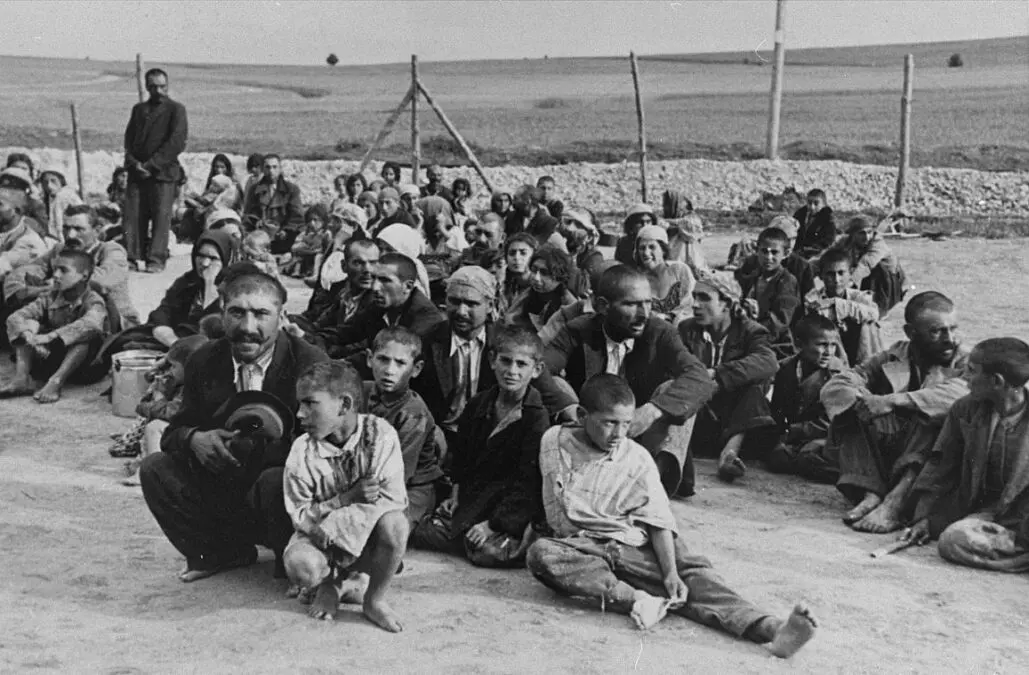They were regarded with fear and suspicion. They were “Gypsies.” They were different. They were thieves and criminals. They were dirty. They had too many children. They had their own religion and a language we did not understand.
Many Romani people live in great poverty and are subject to mass evictions and tremendous harassment by right-wing groups in several countries.
There are over 300,000 Roma people in Bulgaria.
Yes, the “Gypsies” were truly living outside of society; they were ostracized and they were discriminated against. They were not allowed into the local shop, and “respectable” people would never allow them inside their homes. This was the attitude decades ago; but many Roma (as they are officially named) are still fighting discrimination and living in poverty. According to Amnesty International,“Numbering between 10 and 12 million people, the Roma are one of Europe’s largest and most disadvantaged minorities.” They live in 38 countries. The majority live in Turkey, Romania, Bulgaria, Spain and Russia, according to the European Union (EU), shares Magda Matache, Executive Director of Romani CRISS, an NGO that defends and promotes the rights of the Roma as full European Union citizens.
French police inspect an illegal Roma camp in Aix-en-Provence to control and check the identity of its residents on August 19, 2010. France has deported hundreds of Roma people since President Nicolas Sarkozy unveiled a crackdown on crime and immigration with the dismantling of some 300 illegal camps that was condemned by rights groups. The eviction of Roma communities has continued in France since 2010.
International Roma Day – celebrated every year on 8 of april, – was officially declared in 1990 in Serock, Poland, the site of the fourth World Romani Congress of the International Romani Union (IRU). On April 8th 1971, the first World Romani Congress was held in Oprington, near London. The day highlights the plight of many marginalized Romani communities – but also celebrates their rich culture and traditions.
So who are the Roma?
They are an ancient people. According to academic studies, the Roma originally came from India. The roots of the Romani language are there; and recent genetic studies also show they moved from north-west India around 1,500 years ago, eventually settling in the Balkans in the 12th century. In several countries, they became slaves or serfs of one sort or another during medieval times. From the 19th century onwards, large groups of Roma migrated to North and even to South America. Nazi Germany systematically persecuted the Roma; along with Jews, homosexuals, black people and those with disabilities, they were sent to concentration camps. Up to 1.5 million Romas are estimated to have been killed during this period. They did not fare well under Communist regimes either, however, with forced sterilization a common practice.
Although originally Hindu, and adhering to some Hindu family practices to this day, most Roma today are Muslims or Christians. It’s all quite mixed up though, depending on the country they live in. Romani people are very musical and greatly influenced many forms of European music over the centuries; they are famous for their wedding music, too. The Spanish flamenco musical form is actually Roma music.
U.S. Secretary of State John Kerry issued a statement for International Roma Day, today (at least one million Roma live in the United States). Here it is:
Today of all days, all the American people are particularly thinking of the Roma around the world. We celebrate the rich Romani culture and contributions to our societies in Europe, the United States, and beyond. We also renew our commitment to remove the obstacles that keep millions of Roma on the margins of society and prevent them from realizing their full potential.
We each have a responsibility to speak out against hateful anti-Roma rhetoric and all forms of violence, wherever they occur. We must help provide Romani communities the opportunities they need to build a better future for their families.
The United States will continue to work with our European and international partners to promote tolerance, dignity, and equal treatment for all Roma.
Modern-day Roma continue to fight for the rights of their people. Magda Matache, who heads an NGO that defends the rights of Roma, observes: “I think the role of activists, but also of society, is to find the means to help those who lost hope and fell below the level of human dignity, in order to regain equality, so that, one day, we, the Roma, shall all feel and understand that expressing and giving continuity to our identity makes us honorable.”
These comments, of course, could apply to many marginalized minority groups. A healthy democracy is not about the will of the majority; it is about how we protect our minorities and support diversity.
The Roma are a proud people whose often tragic past has been one of struggle for respect and dignity. Let’s hope for a better future for them.







